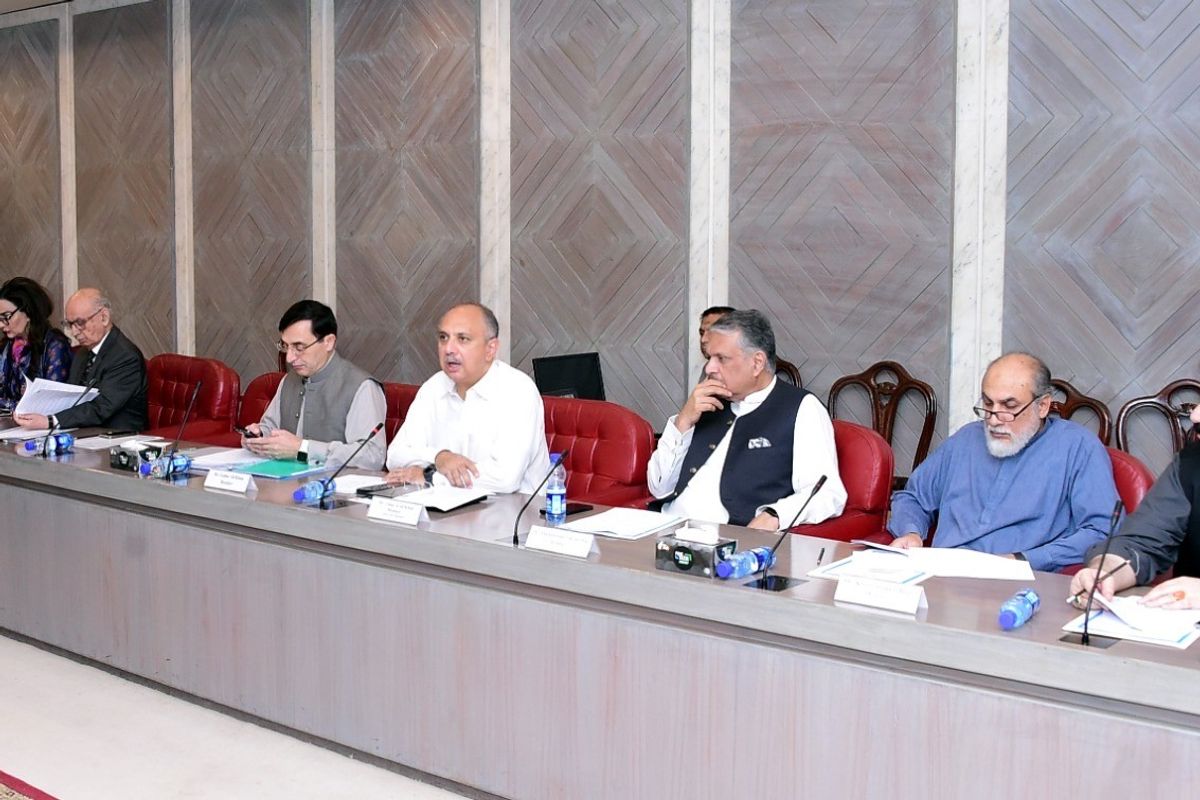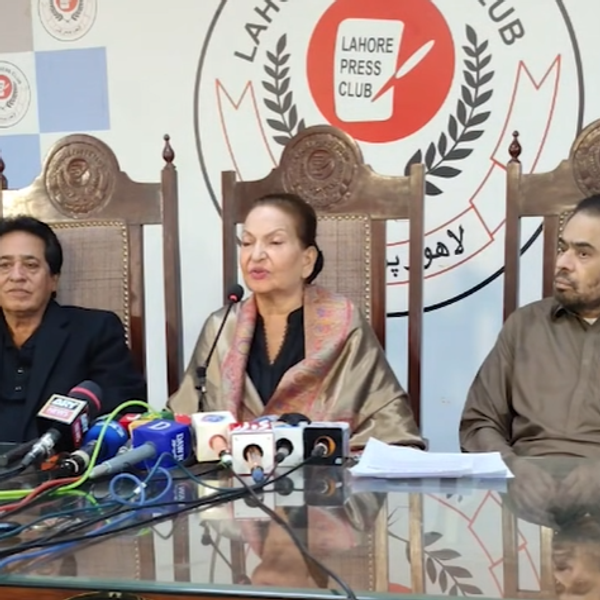UN rapporteur's letter on Pakistan's proposed constitutional amendments explained
Situations in which the executive is 'able to control or direct' the judiciary 'is incompatible with the notion of an independent tribunal,' UN special rapporteur on independence of judges and lawyers

Umer Zaib
Senior Producer
Umer Zaib is a Karachi-based journalist and good Samaritan with five years of experience at Pakistan's leading news publications.

Parliamentary leaders attend a meeting of the Special Committee on constitutional amendments at the Parliament House on October 17, 2024.
National Assembly
UN expert warns new court empowers executive branch
Changes to judicial appointments and tenure criticized
Performance reviews for judges seen as potential political tool
A UN human rights expert has raised alarm over Pakistan's proposed 26th constitutional amendment, warning it could severely undermine judicial independence and violate international law.
In a letter dated October 14, 2024, Margaret Satterthwaite, the U.N. Special Rapporteur on the independence of judges and lawyers, outlined numerous issues with the draft amendment, focusing on changes to judicial appointments, oversight, and the potential creation of a new Federal Constitutional Court (FCC).
UN Special Rapporteurs are independent human rights experts appointed by the U.N. Human Rights Council to investigate, monitor, and report on specific human rights issues or country situations.
Satterthwaite's comments are based on a draft circulated in the media last month, which may differ from the version eventually tabled in parliament.
Judicial appointments and tenure
One of Satterthwaite's primary concerns centers on the proposed changes to judicial appointments and tenure. The draft amendment would alter the composition of the Judicial Commission responsible for appointing judges, reducing representation from the Supreme Court and eliminating representation from high courts.
"Judges should be selected based on their training or qualifications in law, as well as their integrity and ability. The method of judicial selection must include safeguards against judicial appointments for improper motives," Satterthwaite wrote, highlighting the changes allow.
She emphasized the importance of merit-based, non-political appointment procedures, quoting from her previous reports: "prioritizing non-political appointment procedures, strictly linked to professional quality and merit, and commitment to the values of the rule of law and the standards outlined in the Basic Principles on the Independence of the Judiciary."
The proposed changes to judicial tenure also drew criticism. The proposed amendment seeks to set different retirement ages for certain judges and introduces fixed terms of three years for certain positions.
Satterthwaite warned that such measures could compromise judicial independence.
"The Human Rights Committee has repeatedly expressed concern over the lack of security of judicial office created by short judicial terms or legislation allowing for judges to be removed for reasons that could be politically manipulated," she wrote, adding that "appointing judges for short terms weakens the judicial system and negatively impacts the independence and professional development of judges."
Performance reviews and inquiries
Another contentious aspect of the proposed amendment is the introduction of annual performance evaluations for high court judges. Satterthwaite cautioned that this could potentially be used as a tool for political influence.
"International standards provide that judges shall be subject to suspension or removal only for reasons of incapacity or behavior that renders them unfit to discharge their duties," she stated.
The rapporteur emphasized that any disciplinary proceedings should adhere to established standards of judicial conduct and be subject to independent review.
The amendment also proposes expanding the grounds for initiating inquiries against judges to include "inefficiency in the performance of the duties of his office." Satterthwaite warned that this broad criterion could be exploited to undermine judicial independence.
Creation of Federal Constitutional Court
Satterthwaite expressed concerns about the proposed FCC, arguing it would grant excessive power to the executive branch in judicial appointments.
"The proposed amendment would vest a uniquely powerful role in the President for appointing judges to what would become Pakistan's highest court," Satterthwaite wrote.
She emphasized that this arrangement contradicts international standards, citing the Human Rights Committee's position that executive control over the judiciary is "incompatible with the notion of an independent tribunal."
Satterthwaite contends that based on existing proposals, the FCC would lack sufficient independence from the executive and legislative branches, failing to meet the international law requirement of a truly separate judicial body.
She concluded, "The amendments as they stand would run counter to international standards providing that State parties should establish a competent tribunal that 'is independent of the executive and legislative branches of government or enjoys in specific cases judicial independence in deciding legal matters in proceedings that are judicial in nature' to determine rights and obligations. The failure to allow access to such a tribunal in specific cases would amount to a violation of article 14 of the ICCPR."
'Judicial bench shopping'
Of particular concern is the FCC's proposed ability to transfer cases between courts. Satterthwaite warned that this power could lead to "a highly unusual kind of 'forum shopping', or 'judicial bench shopping', by designating a case to a particular High Court, or to itself."
She added that if the FCC were to transfer an Article 199 case (concerning judicial review) to itself, "the parties will also be deprived of the right of appeal.
Broader Implications
Satterthwaite underscored the fundamental importance of judicial independence in protecting human rights and upholding the rule of law. She cited Article 14 of the International Covenant on Civil and Political Rights (ICCPR), which Pakistan ratified in 2010, guaranteeing the right to a fair trial before an independent and impartial tribunal.
"[These amendments] pose a real risk of violation of harm to judicial independence and to individuals' rights to a fair and public hearing by a competent, independent and impartial tribunal, as guaranteed by Article 14 of the ICCPR," she said.
The rapporteur also noted that the proposed amendments have "caused significant alarm amongst the legal community in Pakistan," referencing an open letter from the Pakistan Bar Council and 317 lawyers urging judges to resist the changes.
More than 300 lawyers write an open letter, humbly urging the members of the Hon’able Judiciary not to concede space/compromising on judicial independence by accepting the PCO style package being introduced by the incumbent government & its allies, in the garb of “Constitutional… pic.twitter.com/8JzKd52yEf
— Barrister Ahsan J. Pirzada (@AhsanJPirzada) September 29, 2024
The rapporteur's criticisms regarding the FCC specifically may not apply to a potential alternative being considered - a dedicated constitutional bench within the existing Supreme Court.
Satterthwaite offered to engage in dialogue with the Pakistani government to ensure the proposal complies with international human rights obligations. Her letter and any response from the Pakistani government will be made public and presented to the UN Human Rights Council.
What is the proposed 26th amendment?
The Pakistani government is proposing sweeping judicial reforms through a Constitutional Amendment Bill, coinciding with the upcoming retirement of the current Chief Justice, Qazi Faez Isa.
Nukta, through discussions with parliamentarians involved in special committee meetings on the amendment, has learned of several key provisions in the proposed bill as it looks now.
These include establishing a new constitutional court, changing the selection process for chief justices, and revamping judicial appointments and transfers.
Inspired by the 2006 Charter of Democracy, the reforms aim to address long-standing concerns about judicial independence and accountability.
However, the bill faces significant political hurdles, requiring a two-thirds parliamentary majority that the government currently lacks.
The proposed changes, including government appointment of the constitutional court's chief justice and potential rotation of high court judges, have ignited debate about their potential impact on Pakistan's judicial system.










Comments
See what people are discussing